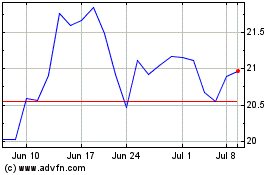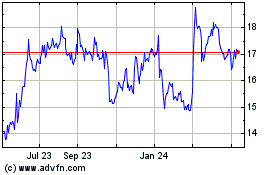Companies Make Push to Give Workers Time to Vote
February 19 2020 - 4:34PM
Dow Jones News
By Chip Cutter
Hundreds of U.S. companies plan to give employees time off to
vote in this year's presidential election as part of a business-led
push to lift the nation's traditionally low voter turnout.
At least 383 companies, with more than two million workers in 50
states, including JPMorgan Chase & Co., Target Corp., Best Buy
Co. and Hewlett Packard Enterprise Co., have signed on to the Time
to Vote initiative. Organizers said they aim to enlist 1,000
companies by November, more than double the number that
participated in a similar turnout drive in the 2018 midterm
elections.
Some states require employers to give workers time to vote if
requested, but many companies are taking additional steps. A number
plan to grant paid time off, while a few businesses such as the
outdoor clothing company Patagonia said they might close stores and
offices on Election Day. Some companies are also rolling out
monthslong get-out-the-vote campaigns and helping employees
navigate a patchwork of voter-registration deadlines and primary
dates.
"Democracy really only works if people go out and vote," said
Chip Bergh, chief executive of Levi Strauss & Co. "So how do we
make sure that every eligible voter is registered and gets
out?"
The initiative is a nonpartisan effort, the companies said,
although some organizers of the Time to Vote campaign have been
linked to political causes.
"This is not about who gets elected," said Neil Blumenthal,
co-founder and co-chief executive of the eyeglasses seller Warby
Parker, one of the participating employers. "This is about ensuring
people participate in our democracy."
U.S. election turnout remains lower than in many other developed
nations. In the 2016 presidential election, only about 60% of
eligible voters cast a ballot, according to data tracked by the
United States Elections Project. Scheduling conflicts and being too
busy rank among the top reasons registered voters don't
participate, Census Bureau surveys routinely show.
Mr. Blumenthal said Warby Parker, which employs about 2,700
people in the U.S., is asking its retail-outlet employees in
various cities how long they waited to vote at polling stations in
previous elections so managers can plan schedules. In states with
early voting, Mr. Blumenthal said the company is also encouraging
that option.
Some companies said they want to make it easier for workers to
obtain election-related information. Johnson Controls International
PLC, the industrial and technology conglomerate, is developing a
"one-stop shop" on its internal website that could, for instance,
provide election deadlines, said Katie McGinty, the company's vice
president of global government relations.
Yogurt maker Chobani plans to use email, internal videos and
town halls to raise voting awareness, said Peter McGuinness, the
company's president. Chobani, which joined the Time to Vote
initiative last year, grants its workers three hours of paid time
off on Election Day.
Tax preparer Jackson Hewitt Tax Service Inc. will close its
corporate and company-owned locations at 3 p.m. on Election Day and
offer paid time off and encourage franchisees to do the same. Levi
Strauss is giving paid time off to its retail and corporate
employees and plans to bring in outside groups to help educate
workers on ballot issues.
Some people are taking matters into their own hands. The
nonpartisan nonprofit Vote.org said it has received emails from
workers asking how their companies can do more to support employees
in voting. In addition, close to 500 employers have signed on to
the group's initiative known as ElectionDay.org, in which companies
pledge to offer paid time to vote, said Nora Gilbert, director of
partnerships at Vote.org.
Beehive Strategic Communication, a 15-person St. Paul,
Minn.-based communications firm, is banning meetings during the
first and last two hours of the workday on March 3, which is Super
Tuesday, when the Minnesota primary is scheduled, Chief Executive
Lisa Kolrud Hannum said. The company will close its office Nov. 3,
the day of the general election, giving employees a paid
holiday.
Political divisions persist in many workplaces. In a survey of
U.S. workers this month by the research and consulting firm Gartner
Inc., about nine out of 10 employees said they discuss politics at
work or overhear political conversations at work, and about one in
three workers said they actively avoid colleagues whose political
beliefs differ from their own. About 47% of respondents said
politics affects their ability to get work done.
"Let's fill the election year with something that everyone can
rally around," as opposed to talking politics, Ms. Hannum said.
"That's voting."
Write to Chip Cutter at chip.cutter@wsj.com
(END) Dow Jones Newswires
February 19, 2020 16:19 ET (21:19 GMT)
Copyright (c) 2020 Dow Jones & Company, Inc.
Hewlett Packard Enterprise (NYSE:HPE)
Historical Stock Chart
From Mar 2024 to Apr 2024

Hewlett Packard Enterprise (NYSE:HPE)
Historical Stock Chart
From Apr 2023 to Apr 2024
